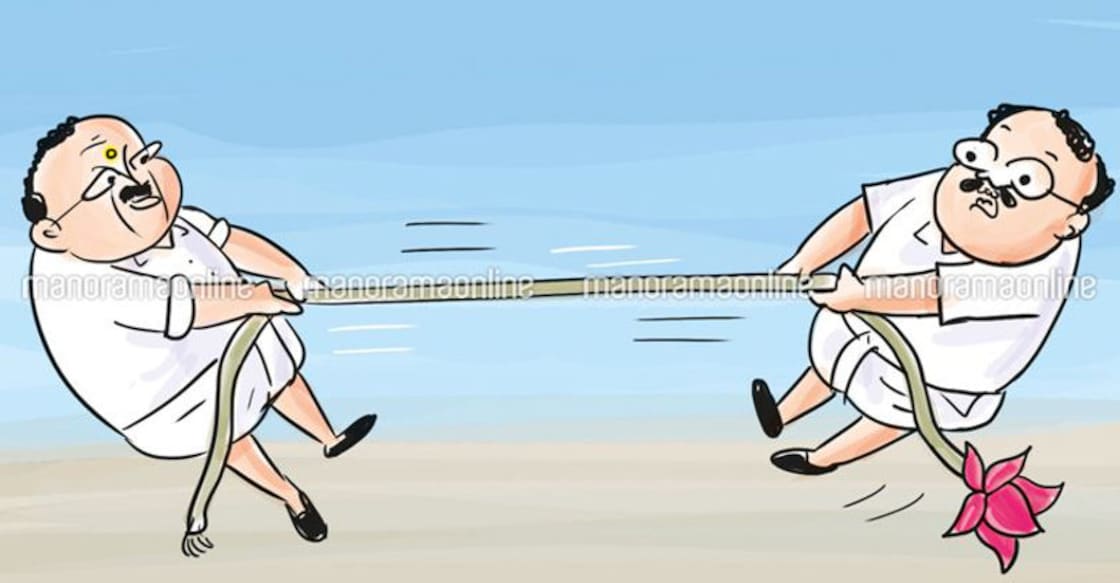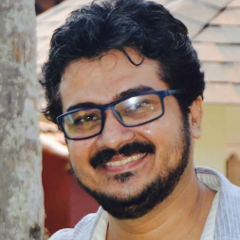‘Golden opportunity’ gone astray: BJP can’t move on from Sabarimala

Mail This Article
The BJP unit in Kerala is inspired by the "golden opportunity" presented by the Supreme Court verdict allowing all women to go to Sabarimala. Yet the party is clueless about the course and effects of the sit-in in front of the government secretariat in Thiruvananthapuram. Party leaders are torn between the opportunities and uncertainty triggered by the protests in front of the hill shrine.
The party leadership claims that the attempts to block women aged between 10 and 50 at Sabarimala have made the party dearer among Hindu sections. The talks in the party meetings are focused on strategies to convert the goodwill to votes in the general election next year.
Prime Minister Narendra Modi’s scheduled visit to Kerala is a clear indication that the BJP has shifted its poll machinery to the top gear. Yet the party is bogged down by the frequent turn-arounds on stands and deep-rooted factionalism.
Changing equations
Though BJP state president P S Sreedharan Pillai had distanced himself from the dominant group led by P K Krishna Das and V Muraleedharan, he has been drifting closer to Das of late. Pillai and Muraleedharan are impossible colleagues and their rivalry goes back to their associations with the party’s student wing, ABVP.
Muraleedharan’s presence in Kerala was limited after Pillai’s ascent to the party president’s post. Muraleedharan spends most of his time in Delhi and Andhra, where he has been appointed as a troubleshooter.
Yet he kicked a hornets’ nest in Kerala by organising a meeting of party workers in Thiruvananthapuram. Though the declared agenda of the meeting was to abide by a central direction that party MPs should spread Modi’s ‘Mann Ki Baat’ speech, his rival faction alleged that the gathering was a group meeting in effect.
The rift between the two factions deepened with the arrest of K Surendran, Muraleedharan’s right-hand man. The leaders alleged that the organised protests against the arrest was absent in the initial days. The first leader to visit Surendran’s house was P P Mukundan, a persona non-grata in the BJP. The situation changed in favour of Surendran after the Muraleedharan faction brought up the issue at a workers’ meeting in Kozhikode.
Muraleedharan and his men used Surendran’s release on bail as an opportunity to show their strength among party cadre. The message was not lost on Pillai, who accompanied Surendran in the open jeep in his capacity as the party’s state president.
He struck back by sidelining Muraleedharan loyalists at the sit-in in front of the secretariat. State general secretary M T Ramesh and secretary V K Sajeev, prominent leaders of the Krishna Das camp, were given the responsibility of the protest. The initial bonhomie between the camps were missing in the later part of the agitation.
The martyr that was not
That was when a man on fire swooshed into the sit-in venue in the middle of the night. The BJP leaders were quick to claim the unfortunate suicide victim as a martyr for their cause. Ramesh mooted the idea of a state-wide hartal to cash in on the suicide and declared it.
The police later found that Venugopalan Nair was led to suicide by depression and he had nothing to do with the BJP’s struggle or the Sabarimala controversy. He himself said so in his deathbed. The public backlash against the hartal has given enough fodder for the other faction to strike back.
The RSS is clearly peeved at all these drama. The RSS top brass has not patched up with the BJP since the removal of Kummanam Rajasekharan as the party president in Kerala. Kummanam, now acting as the governor of faraway Mizoram, has been instrumental in steering the BJP the way the RSS liked.
The BJP is now focused on street agitations such as Sabarimala and campaigns for the imminent poll. The RSS had its reservations about the shift of the protest to Thiruvananthapuram. Its leaders shared the reservations with BJP top leaders at a meeting held in Kochi.
Towards Ayyappa Jyothi
The BJP had roped in all district committees for the successful conduct of the Sabarimala stir in front of the secretariat. Though Sabarimala is truly a trump card for the BJP, it should consider whether it is wise to spend all its energies on the issue at a time when it should be going full steam for the election campaign. The visit of Modi stems from this line of thinking.
Modi’s visit was preceded by his telecommunications in all the Lok Sabha constituencies in the state. The party plans to set up call centres across the state to create awareness about the central government’s achievements. Yet the party cannot move on from Sabarimala.
The RSS is busy organising the Ayyappa Jyothi planned for December 26. The plan is to light earthen lamps from Parassala to Manjeswaram at 5.30 in the evening.
The party leaders have climbed down from Sabarimala but the issue refuses to die down.


